|
|
|
Sort Order |
|
|
|
Items / Page
|
|
|
|
|
|
|
| Srl | Item |
| 1 |
ID:
193612


|
|
|
|
|
| Summary/Abstract |
The emergence in eighteenth-century India of literary compositions that used the elite registers of what was, at the time, called ‘Rekhtah’, and later defined as Urdu, is poorly understood. Conventionally, after an initial infatuation in Delhi with the works of Vali Dakhani,1 a mid-century break is assumed, exemplified by the revision of Zuhur ud-Din Hatim’s Divan as Divanzadah in the 1750s. Scholars have viewed this as a radical intervention in the creation of Urdu, which excised old vernacular models and embraced further Persianization. This article re-examines the evidence, combining methodologies from literary and historical studies. It points to the continuities present in Hatim’s revision, including sustained engagement with Vali, even as Hatim attempted to appeal to new audiences, incorporating new trends alongside older literary models. Foregrounding literary networks and arenas of poetic practice shows the limited impact of the proscriptions and literary criticisms voiced by Hatim’s critics. In studying the contested space of literary aesthetics and linguistic shifts against self-fashioning within changing networks, this article demonstrates that the relationship between the Persianate and vernacular sphere continued to be generative, rather than oppositional or hierarchical.
|
|
|
|
|
|
|
|
|
|
|
|
|
|
|
|
| 2 |
ID:
193619


|
|
|
|
|
| Summary/Abstract |
By looking at the September 1949 devaluation dilemma faced by the governments of Pakistan and India, this article argues that it was an early episode of divergence between them following partition. The reasons why Pakistan did not devalue when India did so have remained largely obscured in the historiography. Deeply contested, the decision was a determining event through which the state staked its claim for economic sovereignty, internally and externally. It led to a 17-month-long official trade deadlock, especially in the eastern region of partitioned Bengal. It ended when the two governments established an exchange ratio for the two rupees, no longer at par with each other. This interactive delinking of currencies was symptomatic of the improvisational decoupling of the colonial subcontinent’s post-colonial states. In tracing its trajectory, this article contributes to the inconsiderable literature on why devaluation did not happen in Pakistan, revises the rationale offered, and presents the event as a contingent exercise in economic decolonization, generative of a post-colonial sovereign difference.
|
|
|
|
|
|
|
|
|
|
|
|
|
|
|
|
| 3 |
ID:
193611
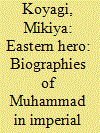

|
|
|
|
|
| Summary/Abstract |
While participating in the discourse of world religions, Japanese biographers published accounts of Muhammad’s life in many genres of academic and popular books during the Meiji and Taisho eras (1868–1926). This article unravels how these biographical accounts played a crucial role in facilitating a geographical imaginary of Asia/the East which incorporated both Japan and West Asia. Situated in a radically different context from the Victorian biographers who inspired them, Japanese biographers constantly compared Muhammad to historical figures familiar to them, most notably Buddha and Nichiren, and reinterpreted the life of Muhammad, relying exclusively on European-language sources. In particular, in contrast to another strand of pan-Asianism that stressed peacefulness as an inherent quality of the East, the biographers identified Muhammad’s perceived militancy and the miracles he performed as signs of the values shared by Japan and Islamic civilization. Using the person of Muhammad as a concrete piece of evidence, Japanese biographers reimagined an Eastern civilizational space that could stretch from Tokyo to Mecca.
|
|
|
|
|
|
|
|
|
|
|
|
|
|
|
|
| 4 |
ID:
193616
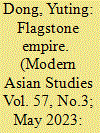

|
|
|
|
|
| Summary/Abstract |
This article investigates Japanese imperialism in northeast China through its road construction infrastructure projects within its railway auxiliary zone (1906–1932) and Manchuria at large (1932–1945). The materiality of roads unveils a history of how Japanese engineers adapted to local practices and absorbed local knowledge in building physical infrastructure and developing their technical expertise. These engineers engaged with local practices rooted in pre-existing social and natural environments to facilitate road construction. At the same time, in Manchuria their technical expertise in construction was built on the absorption and subsequent erasure of local workers’ vernacular craft. Rather than the physical realization of an imperialist, top-down vision of modernization, imperial infrastructure projects were in fact hybrid productions of technical expertise, and local vernacular knowledge and skills. By constructing roads, engineers helped to expand Japan’s political and economic influence in northeast China, assert domination over Chinese residential areas and business interests, and coerce Chinese subjects into complying with policies and rules issued by Japanese administrations. The materials of roads—gravel, granite flagstone, and concrete—illustrate a complex relationship between Japanese imperial agents and local environments.
|
|
|
|
|
|
|
|
|
|
|
|
|
|
|
|
| 5 |
ID:
193622


|
|
|
|
|
| Summary/Abstract |
Following victory in the Russo-Japanese War, the Meiji government sought to expand its maritime influence in Northeast Asia by developing pelagic fisheries in the newly acquired Kwantung leased territory, but it encountered immediate resistance from the Qing court, which had just embarked upon ambitious reform to strengthen maritime defence through the building of a national fishing industry. The dispute first emerged as a clash between Japanese and Chinese fishery protection companies on the seas adjacent to the Chinese city of Xiongyue. It then gave rise to a protracted Sino-Japanese legal debate on the question of whether the Xiongyue fishing ground was in the free sea or part of Chinese territorial waters. However, the 1912 settlement agreement made no mention of the legal status of the fishing ground. By examining this oft-neglected dispute, this article not only provides a rare East Asian case that illustrates the tension between the requirements of national sea borders and the principle of navigational freedom, but also explores how the Meiji and Qing governments perceived and practised international maritime law at the turn of the twentieth century. It argues that neither government viewed international maritime law as the only referential framework to solve the dispute, especially when it contributed little to the conflict settlement and contradicted their perceptions of the historical relations between East Asian countries.
|
|
|
|
|
|
|
|
|
|
|
|
|
|
|
|
| 6 |
ID:
193617
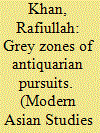

|
|
|
|
|
| Summary/Abstract |
This article discusses and analyses the Barger archaeological expedition of 1938 to the princely state of Swat. It argues that archaeology in princely, as well as in British, India did not originate and develop in a unilinear manner. This understanding is in line with the recent realization of variations in the historiography of native India. Given this, an attempt has been made to situate the Swat state in relation to British paramountcy. Miangul Abdul Wadud, the first British-recognized ruler of the state, was aware of colonial power relations and had a friendly attitude towards the British. He dealt with Swat’s archaeology with political and dynastic expediencies in mind. Since there was no proper legal and institutional dispensation in place in the area, the Frontier government officials and the political administration at Malakand treated the Barger expedition as a local matter, beyond the legal jurisdiction and disciplinary apparatuses of the colonial state. The Archaeological Survey of India (ASI) and the related laws were, thus, kept out of the entire enterprise. All this ensured a smooth transfer of antiquities to England at a time when strong legal-institutional and ethical dimensions to archaeology were in place within British India and in some princely states.
|
|
|
|
|
|
|
|
|
|
|
|
|
|
|
|
| 7 |
ID:
193618


|
|
|
|
|
| Summary/Abstract |
Focusing on soy sauce exports from Hong Kong to the United States, this article traces the origin of the ‘Made in Hong Kong’ label to the US-led embargo on Chinese goods during the Korean War and explores the repercussions the recent Sino-US conflict generated on the label. By examining the history of an enterprise embroiled in two episodes of global trade disruptions, this article reveals how politically motivated US trade policies steered businesses in Hong Kong to pursue commercial opportunities by leveraging geopolitics, both global and local. Strategically capitalizing on Hong Kong’s position during the Cold War that allowed local exports to the United States, Hong Kong entrepreneurs created an international product chain. When the latest Sino-US trade war erupted, Trump’s elimination of the distinction between China-made and Hong Kong-made exports coincided with a wave of local consumerism in Hong Kong and unintentionally imbued meaning into homegrown products. From a commercially expedient marker aimed at satisfying the US government’s anti-China trade requirements, the ‘Made in Hong Kong’ label has recently been repurposed as a badge of local pride and perseverance as Hong Kong/mainland tension escalated. Necessitated by global trade policies and infused with connotations of shifting geopolitics, the malleable ‘Made in Hong Kong’ label signified not only reactions to US policies but also fluid Hong Kong/China relations. In successive rounds of US-initiated trade disruptions, the place-of-origin label reflected Hong Kong’s changing place in global geopolitics and the city’s position vis-à-vis the PRC.
|
|
|
|
|
|
|
|
|
|
|
|
|
|
|
|
| 8 |
ID:
193615


|
|
|
|
|
| Summary/Abstract |
Prison labour was an integral part of the penal order in colonial India in the nineteenth and early twentieth centuries. Especially in Bengal, such coerced labour, overwhelmingly male, was increasingly deployed in handicrafts production rather than in extramural construction projects, a regimen that led to the development of a prison-handicraft complex. Colonial efforts to refine this system focused largely on increasing the severity of the conditions of incarceration and indoor work, but also on the conflicting goal of maximizing the profits of its handiwork. Prisons thus emerged as effective sites of handicrafts production, with the products of their forced labour facilitating the revival of the crafts industry whose growth is generally attributed to the rise of an international arts and crafts movement in Britain and India.
|
|
|
|
|
|
|
|
|
|
|
|
|
|
|
|
| 9 |
ID:
193623
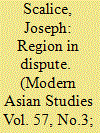

|
|
|
|
|
| Summary/Abstract |
Prior scholarship has treated the Philippines as an outside party to the conflict over the formation of Malaysia, known as Konfrontasi, which has been dealt with as a dispute between Malaysia and Indonesia. This article demonstrates the centrality of the Macapagal administration to the origins of Konfrontasi. Treating Manila as a core actor gives new insight into Konfrontasi, which can be best understood as a regional conflict over the racial and social shape of island Southeast Asia in the final stages of decolonization. Racialized anticommunism, expressed through the forcible redivision of the region to ensure social stability, emerges as the preoccupation of all the state actors promoting and opposing the formation of Malaysia. At the same time, an examination of developments in the Philippines and the actions of the Partido Komunista ng Pilipinas (PKP) gives new insight into the critical function of the Partai Komunis Indonesia (PKI) in this affair.
|
|
|
|
|
|
|
|
|
|
|
|
|
|
|
|
| 10 |
ID:
193613


|
|
|
|
|
| Summary/Abstract |
This article revisits Rabindranath Tagore’s critique of nationalism as well as his interventions on the theme of samaj. The claim is that contained within Tagore’s reflections on nationalism and samaj is a vision of political community that is stipulated as an alternative to the one espoused by the nation-state mode of politics. Tagore’s formulations of the possibilities within samaj suggest his commitment to normative orders grounded in a notion of relationship as a basis for social cooperation. Tagore contrasts and prioritizes the relationship-based orientation of samaj with what he calls the ‘mechanical’ emphasis of forms of community associated with the nation-state. Tagore articulated his views during the high noon of anti-colonial nationalism in India, and he offers a striking secular and modern political alternative to nationalist visions of community, which I classify as upholding a vision of societal politics. In underscoring the modern and political bases of Tagore’s critique of nationalism and his endorsement of social and political forms related to samaj, I suggest that it would be a mistake to classify Tagore’s perspective on nationalism and samaj as reflecting anti-political, or local-traditionalist, or aesthetic responses to the problems attached to national models of community.
|
|
|
|
|
|
|
|
|
|
|
|
|
|
|
|
| 11 |
ID:
193621


|
|
|
|
|
| Summary/Abstract |
This article clarifies a mythologized episode in the early development of the South China Sea disputes and shows how it was later ‘forgotten’ by British policymakers for strategic reasons. Using documents from the UK National Archives it confirms, for the first time, that Qing/Chinese officials did deny responsibility for the Paracel Islands in 1898/1899. It then shows how this correspondence was strategically ignored by British officials during the 1930s in the context of renewed disputes between China, France, and Japan over the sovereignty of the islands. It argues that during the 1930s, British officials sought to bolster the Chinese position in the South China Sea because of a concern that France would remain neutral in any forthcoming conflict. This resulted in Britain taking a view on the sovereignty disputes that was at odds with the evidence in its own archives but which provided useful political support for the Republic of China.
|
|
|
|
|
|
|
|
|
|
|
|
|
|
|
|
| 12 |
ID:
193620
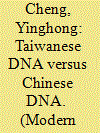

|
|
|
|
|
| Summary/Abstract |
The article analyses how population genetics has impacted on nationalist discourses across the Taiwan Straits and affected the relationship between Taiwan and China since the 1990s. In Taiwan this cutting-edge science has helped to construct a native-based and Taiwan-centred national identity through promoting indigenous peoples’ rights, rejecting a blood-based, cross-Straits nationalism, and founding a pan-Pacific indigenous peoples’ community through genetic links and cultural affinity. In China, after subverting the nationalist myth of Peking Man (a Homo erectus group believed to be the common ancestor of the Chinese) by analysing genetic data, the same group of Chinese genetic scientists have constructed another nationalist myth of a genetically homogenous nationhood. Such a discourse not only valorizes Chinese nationalism through claiming a DNA-based Chineseness across ethnic distinctions but also asserts genetic links between China and Taiwan, therefore providing a ‘scientific’ basis for China’s nationalism in the new century.
|
|
|
|
|
|
|
|
|
|
|
|
|
|
|
|
| 13 |
ID:
193614


|
|
|
|
|
| Summary/Abstract |
The Ming-Qing transition (1618–1683), a dynastic upheaval that not only consumed much of China, but also saw the Qing invasion of Joseon Korea and an influx of refugees into Tokugawa Japan, was a source of inspiration for writers across East Asia. Unofficial, contemporary histories written by Ming and early Qing subjects made their way by land and sea to Korea and Japan, where they were either adapted for domestic audiences or used as the basis for new unofficial histories of the dynastic transition.
|
|
|
|
|
|
|
|
|
|
|
|
|
|
|
|
| 14 |
ID:
193624
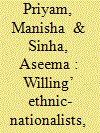

|
|
|
|
|
| Summary/Abstract |
Using evidence regarding the consolidation of Hindu nationalism in India we put forward new ethnographic data about the variety of popular support for a Hindutva project and a new framework that proposes an interactive theory of social identity. This framework helps us understand how Hindu nationalism becomes embedded in society. We assert that Hindu nationalism in India could be fruitfully analysed by focusing on the processes through which ideas of exclusive nationalism spread among ordinary middle-class people and are expressed in micro-level psychological changes at the individual level. The consolidation of Hindu nationalism in India is being authored not only by parties or the state, but also by societal actors, specifically, ordinary middle-class Indians. Hindu nationalism has been spreading in micro-public spheres in a time of apparent peace and between elections, and with the participation of willing supporters. Building on our fieldwork and research in psychology and history, our conversations have also helped us to identify profiles of different types of nationalists, which we categorize as willing ethnic-nationalists, hardliners, bystanders, and moderates. Further, we suggest the need to focus on inter-linked micro-level mechanisms such as diffusion and emulation of Hindu-centric beliefs and ideas, mobilization by hardliners and organizations, and impunity resulting from protection by state agencies, which helps to create willing ethnic-nationalists and sustains Hindu nationalism. Evidence regarding social interactions from a variety of survey organizations concurs with our findings and our ethnographic material allows us to delve deeper into varieties of Hindu nationalist support across diverse ordinary people.
|
|
|
|
|
|
|
|
|
|
|
|
|
|
|
|
|
|
|
|
|